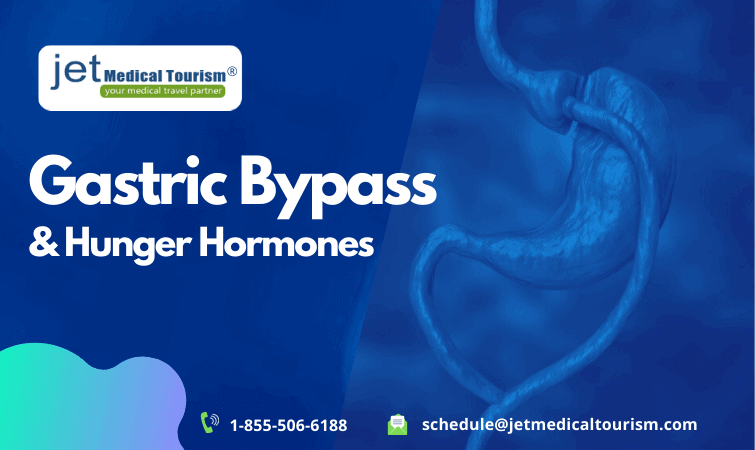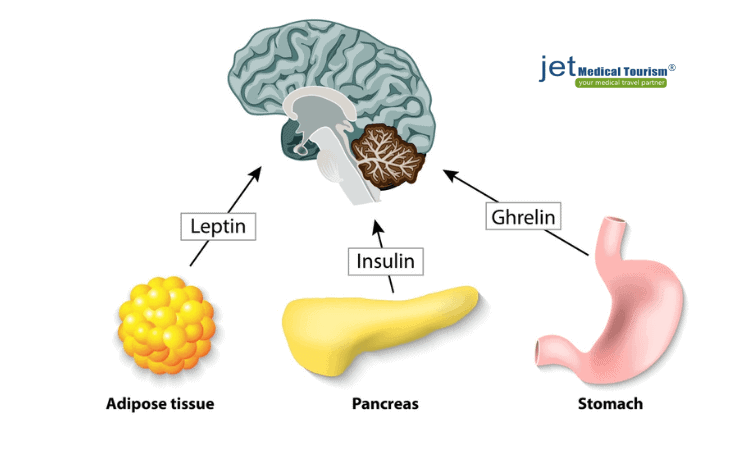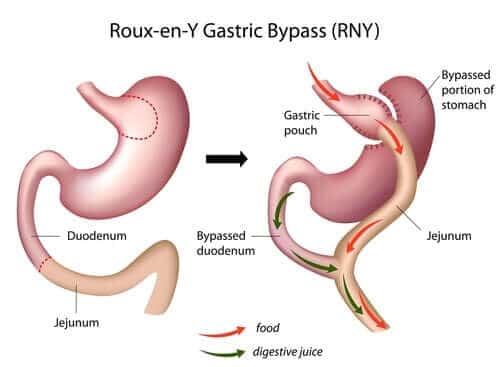Gastric Bypass Surgery and Hunger Hormones

Do you know how your hunger hormones change after bypass surgery? Hunger sensations often influence a person enough to feel the urge to physically eat food. Food choices and quantity impact weight gain or weight loss. But, did you know our hormones control what we choose to eat and just how much?
People try time after time with cost-efficient methods of weight control such as diet and exercise. But, did you know in severe cases such as obesity, diet and exercise are just not enough? “Well, why not?”, you may ask. In obesity, this is a chronic illness working off the brain that changes the way our hunger hormones work. Diet and exercise alone are not able to fix our hunger hormones to change the way we eat long-term.
However surgical intervention, especially with gastric bypass surgery has been proven successful in maintaining long-term weight loss in obese/extremely obese patients. Contact us today for more information.
What is hunger?

Hunger is a sensation felt in the body to tell people it is time to have a meal. People often feel strong hunger sensations in their body multiple times a day on a normal basis when their metabolism digests food.
Combating Weight loss starts with combating hunger
In extreme weight gain like obesity, diet and exercise are just not enough. This uncontrolled food intake ultimately allows minor interventions, such as diets at this point to be useless.
Weight loss surgery such as gastric bypass has provided patients suffering obesity with long-term weight loss success.
- This surgery works to change the imbalance of hunger hormones obese individuals experience.
- Gastric bypass fixes the balance of hunger hormones by resetting the brain (i.e., the hypothalamus).
o The hypothalamus has been proven to be responsible for inducing appetite in the brain by working with hunger hormones.
What types of hunger exist?
There are different types of hunger, mainly emotional hunger and stomach hunger.
Emotional hunger
Hunger sensations telling the body it is time for a person to eat a meal right now due to emotions (negative feelings) are called emotional hunger. Emotional hunger sensations are those felt by people in their heads.
- If a person becomes stressed, sad, or dealing with a difficult life -altering situation, they may be more prone to experience emotional hunger.
- Emotional hunger sensations crave high-calorie food options (comfort food) and take time to go away.
Stomach hunger
When a person experiences a rumbling of the tummy or growling feeling, this is stomach hunger. Stomach hunger can cause people to experience body fatigue or weakness, dizziness in the head, and often develops gradually.
- This type of hunger is a more natural body process as it occurs throughout the day with metabolism.
What are the hunger hormones?
Hunger hormones are ghrelin vs leptin. These hormones work antagonistically to each other. Both hormones work with the hypothalamus, targeting different parts of it.

Ghrelin
The hormone ghrelin is officially known as being responsible for bringing on feelings of hunger in the body. The majority of ghrelin levels in the body come from the upper lining of the stomach, which sends messages to our brains such as “ Yes, I am hungry, it is time to eat right now!”. Having so many functions:
- ghrelin makes people feel the urge to eat
- impacts how we taste food
- fat storage
- increases acid production in the stomach
- increases movement of the GI tract/gut
- decreases the release of insulin
- facilitates an energy balance working with the metabolism
- works with the sleep cycle
- triggered in emotional eating, etc.
In healthy weight individuals, highest ghrelin levels normally occur before meals and then drop to their lowest levels after meals. This spike and drop in ghrelin levels are an important process in humans to allow us to differentiate when to eat.
RELATED READ: What is ghrelin?
Leptin
The satiety hormone or leptin is responsible for telling our body “Yes, I am full now!”. Leptin is made from fat cells in our bodies and works to decrease appetite. According to a study published in 2010 in the Journal of the American Dietetic Association by Dr. Beckman et al., higher leptin levels stimulate a decrease in food intake. Also having many functions, leptin:
- prevents overeating by decreasing food intake
- controls fats storage
- increases energy output
- controls calorie intake, etc.
| Hunger hormones | Main function | Hormonal effect after gastric bypass surgery | Results in the body |
| Ghrelin | Increases appetite | Reduced levels | Person feels less hungry |
| Leptin | Decreases appetite | Increased levels | Person feels full more often with less food |
Hunger hormones and obesity
Obese individuals were found to be leptin resistant. This means obese individuals do not receive the same messages from their bodies that they are full as compared to non-obese individuals. Inside the body of an obese person:
Obesity ghrelin levels are often low
With steadily low ghrelin levels, this causes the brain to mistakenly believe the body is starving, resulting in messages being sent from the individual’s brain to indicate the body is still hungry. The brain is essentially being told (mistakenly due to hormonal imbalance) it needs to produce higher ghrelin levels, which occurs, urging the person to continue to eat more.
Obesity leptin levels are high
In healthy weight individuals, leptin levels are highest when people are full; their brain communicates they are full. A study published in the Obesity reviews in 2007 by Klok, MD, confirmed leptin levels are also high in obese individuals because they are in a state of leptin-resistance.
How can gastric bypass surgery change your body’s hunger hormones?
 Working to combat weight loss, a surgeon reduces the stomach size while at the same time cutting off the area of the stomach when ghrelin predominantly exists (the top of the stomach area; the fundus) in gastric bypass surgery.
Working to combat weight loss, a surgeon reduces the stomach size while at the same time cutting off the area of the stomach when ghrelin predominantly exists (the top of the stomach area; the fundus) in gastric bypass surgery.
In a study published in 2002 by Dr. Cummings, et al., in the New England Journal of Medicine, reported using a 24 hour profile of ghrelin:
- For a group of people who experienced a 17% weight loss due to dieting alone, they showed a 24% increase in ghrelin.
- For a group of people who endured a 36% weight loss from having a gastric bypass, they showed a 77% decrease in ghrelin levels compared to controls (i.e., normal weight).
o This 36% weight loss post-gastric bypass group also showed 72% reduced ghrelin levels when compared to similar controls (i.e., obese weight).
READ THIS ALSO: Gastric bypass weight loss chart, timeline 2020
How to maintain long-term weight loss success after gastric bypass surgery
 Wellness is an important part of the weight loss journey after having a gastric bypass. Exercising also helps us maintain a healthy weight.
Wellness is an important part of the weight loss journey after having a gastric bypass. Exercising also helps us maintain a healthy weight.
- Maintaining a healthy and balanced daily diet (clear fluids/pureed low-calorie food dependent upon stage) after gastric bypass surgery with the right amount of protein (40%), carbs (20%), and fats (40%) can help keep our body weight in check.
- Avoiding stress can prevent hunger hormones from increasing.
Obese individuals can feel guilt or self blame for their situation, just know that you are not alone and it is not your fault.
- According to a study published in 2008 in the International journal of pediatric endocrinology by Austin J. and Marks D., hunger hormone mutations (gene abnormalities) can even cause a person to genetically become obese.
CHECK THIS OUT: Gastric bypass success stories: Carole
For further information on how gastric bypass impacts hunger hormones or to schedule your procedure, contact Jet Medical Tourism® today!
References:
- Makris, M. C., Alexandrou, A., Papatsoutsos, E. G., Malietzis, G., Tsilimigras, D. I., Guerron, A. D., & Moris, D. (2017). Ghrelin and Obesity: Identifying Gaps and Dispelling Myths. A Reappraisal. In vivo (Athens, Greece), 31(6), 1047–1050. https://doi.org/10.21873/invivo.11168. https://www.ncbi.nlm.nih.gov/pmc/articles/PMC5756630/
- Austin, J., & Marks, D. (2009). Hormonal regulators of appetite. International journal of pediatric endocrinology, 2009, 141753. https://doi.org/10.1155/2009/141753 https://ijpeonline.biomedcentral.com/articles/10.1155/2009/141753
- Beckman, L. M., Beckman, T. R., & Earthman, C. P. (2010). Changes in gastrointestinal hormones and leptin after Roux-en-Y gastric bypass procedure: a review. Journal of the American Dietetic Association, 110(4), 571–584. https://doi.org/10.1016/j.jada.2009.12.023. https://www.ncbi.nlm.nih.gov/pmc/articles/PMC4284064/
- Klok MD, Jakobsdottir S, Drent ML. The role of leptin and ghrelin in the regulation of food intake and body weight in humans: a review. Obes Rev. 2007 Jan;8(1):21-34. doi: 10.1111/j.1467-789X.2006.00270.x. https://pubmed.ncbi.nlm.nih.gov/17212793/
- Halliday TM, Polsky S, Schoen JA, Legget KT, Tregellas JR, Williamson KM, Cornier MA. Comparison of surgical versus diet-induced weight loss on appetite regulation and metabolic health outcomes. Physiol Rep. 2019 Apr;7(7):e14048. doi: 10.14814/phy2.14048. https://pubmed.ncbi.nlm.nih.gov/30927343/
- Cummings DE, Weigle DS, Frayo SR, et al. Plasma ghrelin levels after diet-induced weight loss or gastric bypass surgery. N Engl J Med 2002; 346:1623-1630. DOI: 10.1056/NEJMoa012908. https://www.nejm.org/doi/full/10.1056/nejmoa012908



